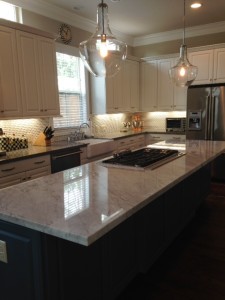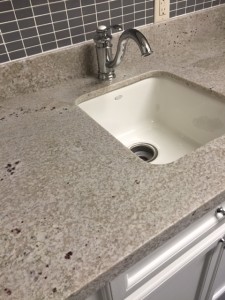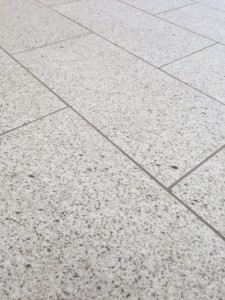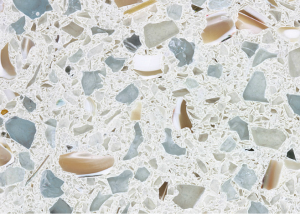I recently paid a visit to my friends at Walker Zanger in the Houston showroom: first because I immensely enjoy their company, but secondly because I love to keep up with the current trends in stone and tile.
Knowing what types of stones people are choosing to install in their homes and businesses helps me because I can advise on how to care for these surfaces. From what I can tell, the color that people are gravitating to the most is white. I can see why. White makes the room light and airy. White is such a clean color, classic and timeless. White natural stone is just plain gorgeous!
So which white stones have I seen lately in your kitchens, bathrooms, and even office buildings? I’m breaking down white stone installations and the best care and maintenance methods for them.
Carrara Marble and Calacatta Marble
These gorgeous white marbles come from Italy. Carrara has gray veining while Calacatta veins are more gold in color. Both stones are used mostly for interior surfaces such as kitchen and bathroom floors and countertops, but Carrara Marble is also used a lot for exterior surfaces as well.

Key facts to know about marble surfaces:
- Marble needs to be cleaned on a regular basis with neutral cleaners (such as Lavenet, Lavenet Green and Akemi Crystal Clean).
- Marble reacts to acid, ammonia and alcohol. It will “etch” when it comes into contact with these three substances. Etch marks are chemical burns that look like the finish or the shine has been removed from the surface of the stone.
- Etch marks seem to show less on honed surfaces because, unlike a high gloss finish, etch marks on a honed marble do not starkly contract the surrounding stone surface.
- Depending on your level of tolerance of etch marks and fine scratches, your marble may need to be re-honed or re-polished every 2-5 years.
Kashmir White Granite
Kashmir White is a granite that comes from India. If you want the look of a lighter stone that can better resist acid etch marks, granite may be a more suitable choice. I’ve seen Kashmir White in a polished form in kitchens as well as in a flamed/textured form in office buildings.


Key facts to know about Kashmir White granite surfaces:
- Kashmir White tends to be porous and absorbs water, oils and grease.
- Because Kashmir White is porous, I recommend sealing your stone upon installation and annually after that.
- We recommend sealing your stone with impregnator sealers such as Seal & Go® S or Seal & Go® W. Sealing your stone will help water, oil and grease from penetrating into the stone. Please keep in mind sealing does not stop acid etch marks.
IceStone
IceStone is manufacturer in the U.S. and made of durable materials: recycled glass and cement. IceStone is not a natural stone surface; it is a man-made material, typically fabricated into countertops, backsplashes and bathroom vanities.

Key facts to know about IceStone countertops:
- The cement in the IceStone reacts (etches) when it comes in contact with acids such as orange juice and vinegar. Etch marks are chemical burns that look like the finish or the shine has been removed from the surface.
- IceStone needs to be cleaned on a regular basis with neutral cleaners such as Lavenet and Lavenet Green.
- Not all man-made countertops can be restored by stone restoration professionals, but IceStone can be re-honed and re-polished. Specialists such as International Stoneworks can restore IceStone countertops by removing fine scratches and etch marks.
Whichever surfaces you choose, it will require some sort of maintenance. These white surfaces add an element of elegance to your home and building. Also, remember that unlike some other non-stone materials, marble, granite and IceStone can be resurfaced, repaired and refinished. If you are in the Houston area, International Stoneworks would be happy to quote you on refinishing your stone surface.
